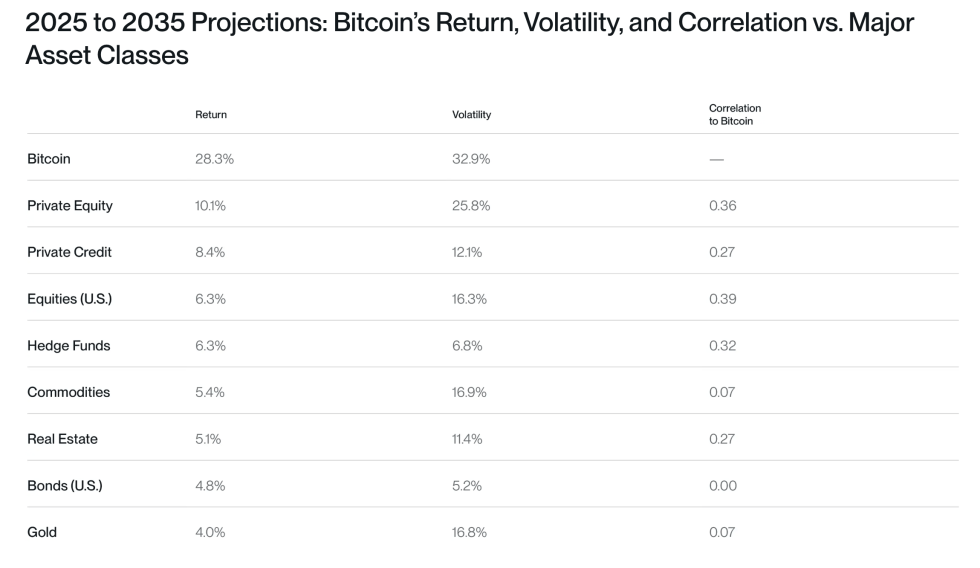Will Bitcoin Beat Every Asset Class? Bitwise Says Institutions Are Taking Notice
Bitcoin’s role in institutional portfolios is continuing to evolve, with new research from Bitwise Asset Management suggesting the asset could become the strongest-performing major investment class in the years ahead.
According to a preview of the firm’s forthcoming Long-Term Capital Market Assumptions (LTCMAs), Bitwise expects Bitcoin to deliver an average compound annual growth rate (CAGR) of 28% over the next 10 years while experiencing gradually declining volatility.
The report, authored by Matt Hougan, Chief Investment Officer at Bitwise, frames Bitcoin not as an opportunistic play but as a maturing asset that is increasingly being considered a core portfolio component.
Hougan noted that the launch and adoption of spot Bitcoin exchange-traded funds (ETFs) in 2024 marked a turning point, prompting large investment platforms and allocators to begin requesting long-term models for Bitcoin alongside traditional assets such as stocks, bonds, and real estate.
Growing Institutional Interest in Bitcoin
Hougan explained that long-term capital market assumptions serve as the foundation for how major financial institutions design portfolios. Each year, firms like JPMorgan and BlackRock release detailed outlooks that guide asset allocation strategies.
For the first time in 2025, professional investors have begun requesting that Bitcoin be included in these frameworks, with Bitwise reporting 12 such inquiries this year compared to none in previous years.
“The fact that they’re now asking for long-term capital market assumptions means that they’ve shifted their view: It’s no longer a one-off for the fringes of the portfolio; it’s starting to be considered for the core,” Hougan said in the memo.
He attributed this change to greater accessibility through regulated ETFs and approval by large account platforms managing trillions in client assets.
Bitwise also emphasized that Bitcoin’s path toward institutional recognition has been gradual, requiring both regulatory clarity and infrastructure improvements.
The launch of spot ETFs in January 2024 created a new on-ramp for traditional allocators, and subsequent approvals across national platforms have since accelerated the process. Hougan described the transition as occurring “brick by brick,” as Bitcoin gains a foothold in professional investment strategies.
Outlook for the Next Decade
Looking ahead, Bitwise forecasts that BTC will not only outperform but stand apart from traditional assets in terms of expected returns. The firm projects a 28.3% CAGR over the next decade, significantly higher than the long-term expectations placed on equities, bonds, and private credit by leading Wall Street institutions.

At the same time, while volatility is expected to remain elevated relative to other asset classes, Bitwise anticipates a steady decline as market depth expands and liquidity continues to improve.
The implications of such a forecast extend beyond performance projections. A consistent inclusion of BTC in LTCMAs could formalize its role in balanced portfolios, shaping how pensions, endowments, and wealth managers approach diversification.
Hougan cautioned that while risks remain, the framework is designed to give professional allocators a basis for strategic decision-making rather than a speculative outlook.
Featured image created with DALL-E, Chart from TradingView
You May Also Like
Stage 37 Arctic Pablo Coin At $0.00088 With BONUS100 Code — Top Meme Coins To Invest This Week As Dogecoin And Shiba Inu Rally

From $0.005 Presale to $2 Launch Target: Why Ozak AI Could Deliver One of the Highest ROI Opportunities in the 2025 Crypto Market
